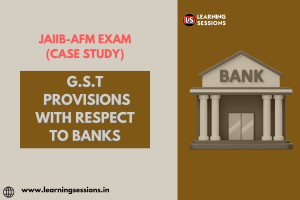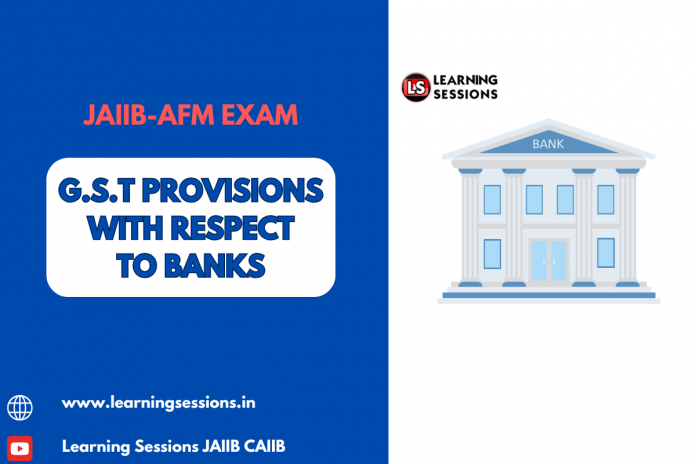Goods and Services Tax (GST) has become a keystone of India’s indirect tax system, unifying various state and central taxes under one framework. For banks, GST compliance is particularly intricate due to the nature of services provided, including financial transactions, cross-border services, and ancillary services. In the JAIIB (Junior Associate of the Indian Institute of Bankers) Accounting & Financial Management (AFM) module, considering GST provisions is critical, as they significantly impact operational costs, compliance measures, and financial reporting. Learning Sessions will take you through this article that explores GST provisions as they apply to banks through a detailed case study, focusing on implications for revenue, input tax credit (ITC), and regulatory compliance.

📚 JAIIB Study Resources 📚
👉 Check Here
👉 Check Here
👉 Check Here
👉 Get Tests Here
👉 Check Here
DOWNLOAD PDF G.S.T PROVISIONS WITH RESPECT TO BANKS -CASE STUDY
Under GST, banks and financial institutions are considered “suppliers of services,” requiring them to charge GST on most taxable services provided to customers. Typical services subject to GST include fees on loans, credit cards, ATM transactions, and processing charges. However, specific financial services, like interest on loans, remain exempt from GST. Given the wide range of services offered by banks, differentiating between taxable and exempt transactions, claiming ITC, and ensuring compliance can be challenging.
For the extensive preparation of candidates, get details through our YouTube videos for JAIIB AFM Module wise Syllabus with explanations and tips to help candidates in their preparation journey.
You may also like these JAIIB case studies:
JAIIB | AFM | STRAIGHT LINE METHOD
JAIIB | AFM | ACCOUNTING CONCEPTS
Taking everything into account, this case study depicts how the Banks navigate the complexities of GST compliance within the financial sector, underscoring the necessity of accurate service classification, diligent ITC management, and multi-branch compliance. For JAIIB applicants, mastering GST provisions in the AFM module prepares them to manage similar compliance and tax-related responsibilities in their banking careers. By implementing a streamlined GST compliance system, the Banks optimize tax credits, reduce risks, and enhance transparency in its service charges. This approach supports a balanced financial strategy that safeguards revenue while maintaining regulatory adherence. Considering GST provisions within the AFM module provides a solid foundation for handling the tax and compliance obligations in the banking sector. Learning Sessions provides additional information about JAIIB AFM TRANSFER PRICING by giving examples of real life scenarios.
Learn more about this case study through our YouTube channel and PDF.
Get access to our Telegram Channel for free Pdfs of JAIIB.





